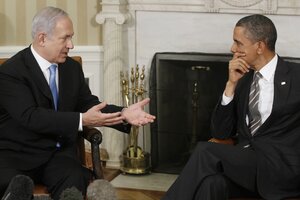War talk on Iran forces the issue: Is Israel a formal US ally?
Obama and Netanyahu can't agree on a threshold for attacking Iran if they also lack clarity on whether the US and Israel are formal allies. Will Israel abandon its strategy of defense self-reliance?

President Obama listens to a lecture from Prime Minister Benjamin Netanyahu of Israel at the White House during their meeting last May.
Charles Dharapak/AP Photo
According to polls, Americans remain wary of supporting the idea of either Israel or the United States – or both together – attacking Iran’s nuclear facilities.
Perhaps one reason for this hesitancy is the fact that Israel, in a historic choice to rely on itself for defense, has never become an official US ally.
America has no treaty obligation to come to Israel’s defense as it does with many countries in Europe and Asia. This little-known fact may loom large in a meeting Monday between President Obama and Israeli Prime Minister Benjamin Netanyahu.
The two men have long differed on how to deal with Iran, especially as a preemptive attack raises more difficult questions than for a traditional war raises. A lack of a formal Israeli-US defense alliance makes it difficult to reconcile their current differences, despite the long friendship and close military cooperation between the two countries.
The Israeli leader, who enjoys wide popularity in the US, has been pressing Mr. Obama to openly threaten Iran with a military strike. And he wants the US to accept Israel’s lower threshold for launching an attack, which would be at the point of Iran simply developing a capability to make an atomic bomb. The pro-Israel lobby in Congress, too, is pushing a bill that would endorse this Israeli view.
In sharp contrast, Obama appears to prefer a different “red line” for an attack on Iran – at the point when Iran actually assembles a bomb. And he prefers to let tighter sanctions and diplomacy play out longer.
His position reflects not only a view that the US is not as vulnerable to Iranian missiles as Israel but also the president’s overall strategy to have the US intervene less often militarily in global affairs while it restores its economy.
And Obama prefers regional problems to be solved primarily by a region’s players, with the US only in a supporting role. (His personal relations with Mr. Netanyahu are also difficult because the president has not been able to persuade Israel to help create a Palestinian state by compromising on the building of Jewish settlements.)
Netanyahu complicates this dispute over Iran by sending contradictory signals on Israel’s basic military doctrine.
Last month, he reiterated a longstanding Israeli stance by saying, “When it comes to our fate, we must rely only on ourselves.” To many Jews, this view reflects the lesson of the Holocaust – that they cannot rely on others to save them. Yet Israel also knows it may not have the military means to destroy Iran’s nuclear facilities unless the US is involved. And it could also lack the defensive capability to withstand an Iranian counterattack.
In 1981, Israel was able to destroy Iraq’s nuclear capability in an aerial attack, and in 2007, it destroyed a Syrian nuclear facility – both without US help. But it has also long relied on billions of dollars in US military aid as well as American military technology, such as missile defenses. The two militaries often hold joint exercises, and Israel is a “partner” in a NATO outreach program called Mediterranean Dialogue.
US and Israeli officials often refer to each other’s country as an “ally.” But the US also uses that term for many countries with whom it has no formal defense treaty. Ever since the 1930s, for example, the US has implicitly been an ally of Saudi Arabia’s monarchy in return for access to Saudi oil.
The lack of a defense treaty with Israel also makes it difficult for US relations with Turkey, which is an official NATO ally. Turkey, for example, is hosting a new NATO missile-defense shield designed to thwart Iranian missiles. But the Islamic government in Ankara also insists that the shield not be used to help Israel. NATO appears to be honoring the request.
Finding a peaceful way to neutralize Iran’s nuclear threat requires that Israel and the US first bring greater clarity to their own relationship.
Is the US willing to shed its longtime attempt to be a mediator in Middle East problems by formally supporting Israel in a military attack? And is Israel ready to abandon its post-Holocaust desire for military self-reliance by becoming an official US ally?
Obama and Netanyahu will need to answer these questions, not only for each other, but for their own people.

